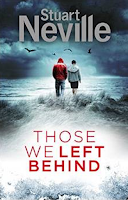Yep, it’s rubber-hose time, folks: a rapid-fire Q&A for those shifty-looking usual suspects …
What crime novel would you most like to have written?
I love the Robert B. Parker Spenser novels (‘you remember more stuff that doesn’t make you money than anyone I know’). I’m also a big fan of the Australian crime writer Peter Temple. My favourite of his has to be The Fatal Shore, and if I were Australian and utterly brilliant, that’s the novel I’d like to have written.
What fictional character would you most like to have been?
Ah, I know the answer to this one - not anyone realistic. Otherwise I could become that person in real life. I’d like to be someone so obviously fictional that I’d live an entirely novel experience. Maybe one of the characters from The Da Vinci Code, though none of the ones that get killed (though how would it feel to be killed, if I were fictional?)
Who do you read for guilty pleasures?
Most writers will tell you, a little righteously, that no reading should feel guilty. I’m not among them. When nothing else hits the spot I go to the library and take out a celebrity biography. I’m a sucker for the rags (not always that raggy) to riches (usually surprisingly rich). Recent under-the-cover reads have included Chris Evans and Alex James. But like McDonalds, one is enough for a while.
Most satisfying writing moment?
There comes a time towards the end of writing a novel when it feels as if the plane is coming into land. The effort of getting this unwieldy contraption off the ground, then finding a destination, then managing the fuel (add other flying metaphors to taste) is almost at an end. Now there are small tweaks that can make significant improvements, and my fingers feel the music in the keyboard. I’m overcome by a physical sense of elation. The euphoria doesn’t last, but that’s the best bit.
If you could recommend one Irish crime novel, what would it be?
This feels the wrong way round – Crime Always Pays should be recommending Irish crime novels to me. I’m pretty up to speed on the brilliant Stuart Neville, and would recommend him to anyone who enjoys a bit of finely-crafted mayhem.
What Irish crime novel would make a great movie?
Kevin Barry’s City of Bohane, with its dapper gangsters and eternal grudges, has to count as a crime novel (among other possible classifications). And even though the rhythms of the language are one of the great pleasures of the Kevin Barry reading experience, the world he creates is intensely visual. He writes a future in techni-colour, and a daring film-maker who could combine the Bohane plot with a cinematic equivalent to Barry’s language could make a film like no other.
Worst / best thing about being a writer?
I like being in charge of my own time, when I am. Not so keen on the anxiety, but mustn’t grumble.
The pitch for your next book is …?
Italian-born Claudia Moretti, as she approaches retirement as a state-employed Speculator, is assigned to Messiah Watch. In particular, she responds to reports of cults where the leader claims to be immortal - from experience the government knows that immortality is trouble. There’s an easy way to refute the claim to immortality, but when Claudia is sent to small town Ephesus in bible-belt Georgia, nothing is quite as it seems.
Acts of the Assassins is the second book in a trilogy, following Lazarus is Dead. This is a ‘trilogy’ in a very loose sense – all three books are self-contained. At the end of Acts of the Assassins all the disciples are dead, except John. This is his story. (Which doesn’t yet have a title – suggestions welcome).
Who are you reading right now?
I’m reading a Bible commentary by Richard Bauckham called The Theology of the Book of Revelation, and alternating that chapter by chapter with an idiot’s guide to physics: The Quantum Universe: Everything that Can Happen Does Happen, by Brian Cox and Jeff Forshaw. You did ask.
God appears and says you can only write OR read. Which would it be?
Would have to be reading. Other writers (especially all of them gathered together) have much more of interest to say than I do.
The three best words to describe your own writing are …?Never knowingly unedited.
Acts of the Assassins by Richard Beard is published by Harvill Secker.



















